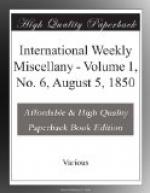Ferdinand had soon, without seeking for it, made acquaintance with several respectable families in the town; and as it generally happens in such cases, he had become quite domesticated in the best country-houses in the neighborhood; and the well-mannered, handsome, and agreeable youth was welcomed everywhere. The simple, patriarchal life in these old mansions and castles—the cordiality of the people, the wild, picturesque scenery, nay, the very legends themselves, were entirely to Hallberg’s taste. He adapted himself easily to his new mode of life, but his heart remained tranquil. This could not last. Before half a year had passed, the battalion to which he belonged was ordered to another station, and he had to part with many friends. The first letter which he wrote after this change bore the impression of impatience at the breaking up of a happy time. Edward found this natural enough; but he was surprised in the following letters to detect signs of a disturbed and desultory state of mind, wholly foreign to his friend’s nature. The riddle was soon solved. Ferdinand’s heart was touched for the first time, and perhaps because the impression had been made late, it was all the deeper. Unfavorable circumstances opposed themselves to his hopes: the young lady was of an ancient family, rich, and betrothed since her childhood to a relation, who was expected shortly to arrive in order to claim her promised hand. Notwithstanding this engagement, Ferdinand and the young girl had become sincerely attached to each other, and had both resolved to dare everything with the hope of being united. They pledged their troth in secret; the darkest mystery enveloped not only their plans, but their affections; and as secrecy was necessary to the advancement of their projects, Ferdinand entreated his friend to forgive him if he did not intrust his whole secret to a sheet of paper that had at least sixty miles to travel, and which must pass through so many hands. It was impossible from his letter to guess the name of the person or the place in question. “You know that I love,” he wrote, “therefore you know that the object of my secret passion is worthy of any sacrifice; for you know your friend too well to believe him capable of any blind infatuation, and this must suffice for the present. No one must suspect what we are to each other; no one here or round the neighborhood must have the slightest clew to our plans. An awful personage will soon make his appearance among us. His violent temper, his inveterate obstinacy, (according to all that one hears of him,) are well calculated to confirm in her a well-founded aversion. But family arrangements and legal contracts exist, the fulfillment of which the opposing party are bent on enforcing. The struggle will be hard—perhaps unsuccessful; notwithstanding, I will strain every nerve. Should I fail, you must console yourself, my dear Edward, with the thought, that it will be no misfortune to your friend to be deprived of an existence rendered miserable by the failure of his dearest hopes, and separation from his dearest friend. Then may all the happiness which Heaven has denied me be vouchsafed to you and her, so that my spirit may look down contentedly from the realms of light, and bless and protect you both.”




